
7 月 . 28, 2024 16:14 Back to list
Exploring the Safety Standards of Food-Grade Titanium Dioxide Production Facilities Worldwide
The Role of Food Safe Titanium Dioxide in the Food Industry
Titanium dioxide (TiO2) is a widely used white pigment and an essential additive in various industries, including food production. Its primary function is to enhance the whiteness and opacity of products, making it a popular choice among manufacturers. However, the safety and regulatory aspects of using titanium dioxide in food have recently prompted extensive discussions among health advocates, regulatory bodies, and consumers.
Understanding Titanium Dioxide
Titanium dioxide is a naturally occurring mineral derived from titanium ore. In its pure form, it is a fine white powder, making it ideal for providing brightness and opacity to a range of products, including paints, cosmetics, and, importantly, food products. When utilized in the food industry, titanium dioxide is often labeled as E171 in Europe and is used in various food items such as confectionery, baking products, sauces, and dairy.
Safety Regulations
The safety of titanium dioxide, particularly in food applications, has been a subject of scrutiny. Regulatory bodies across the globe evaluate food additives to ensure they are safe for consumption. In the European Union, the European Food Safety Authority (EFSA) conducted comprehensive assessments of E171. In 2021, EFSA concluded that titanium dioxide could no longer be considered safe as a food additive due to potential genotoxicity, raising concerns about its long-term effects on human health.
Contrastingly, in the United States, the Food and Drug Administration (FDA) still permits the use of titanium dioxide in food products, considering it safe based on existing studies
. The disparity in regulations raises questions about the credibility of the safety assessments and the potential health risks associated with prolonged consumption of titanium dioxide in food.food safe titanium dioxide factories

The Industrial Impact
With the debate surrounding titanium dioxide's safety, many manufacturers are reconsidering its use. Food producers are facing increased pressure from consumers who are more health-conscious and demand transparency about ingredient safety. Consequently, some companies have begun to reformulate their products, opting for natural alternatives and removing titanium dioxide altogether.
As titanium dioxide has gained notoriety, the food industry is experiencing a shift toward safer and more natural alternatives. Natural coloring agents, such as beet juice powder and spirulina, are increasingly being adopted to replace synthetic additives. While these alternatives may not always match the performance of titanium dioxide, they offer a more appealing option for health-conscious consumers.
Looking Forward
The future of titanium dioxide in food production will likely depend on ongoing research and regulatory changes. As we continue to learn more about food safety and consumer preferences evolve, the industry may see a significant transformation in how food additives are viewed and utilized.
For manufacturers and consumers alike, it is essential to remain informed about the ingredients that make up the food we consume. Transparency and education will play critical roles in the acceptance of any food additive, including titanium dioxide.
In conclusion, while titanium dioxide has been a staple in the food industry for many years, recent safety concerns have sparked considerable debate. As more consumers demand safer options, food manufacturers are likely to adapt by exploring alternatives. The path forward will require thoughtful consideration of both safety and consumer preferences, underscoring the importance of continuing research and regulation in the food industry.
-
Lithopone for Plastic & TiO2 R-5568/SK-6658 Masterbatch Solutions
NewsMay.30,2025
-
China Leading Rutile TiO2 Manufacturer - R5566 & R996 Grades Available
NewsMay.30,2025
-
High-Purity Anatase & Rutile TiO2 Powder Trusted Manufacturer
NewsMay.30,2025
-
High-Purity Anatase Products Trusted Supplier & Manufacturer
NewsMay.29,2025
-
Best Price Eco-Friendly Rutile TiO2 Supplier & Wholesale Factory
NewsMay.29,2025
-
Chinese Anatase Titanium Dioxide for Ceramic Glaze Reliable Supplier
NewsMay.29,2025
